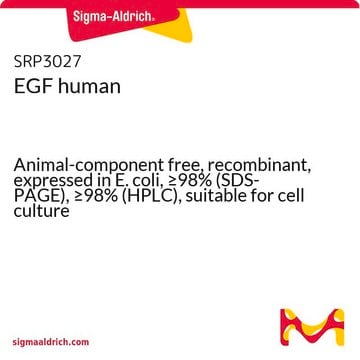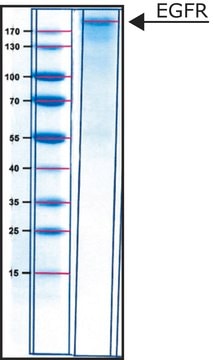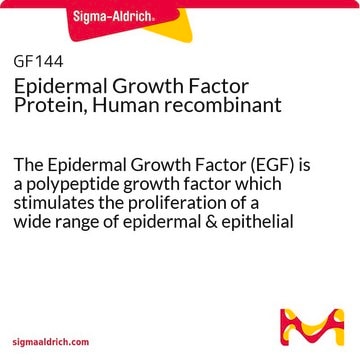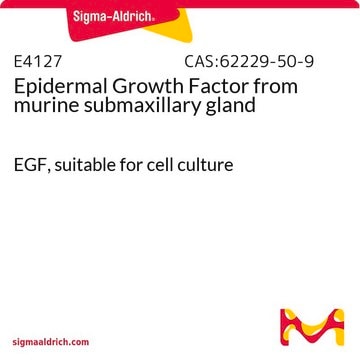E3641
Epidermal Growth Factor Receptor human
buffered aqueous glycerol solution, 5,000-30,000 units/mg protein (Lowry)
Sinónimos:
EGFR
About This Item
Productos recomendados
biological source
human
Quality Level
form
buffered aqueous glycerol solution
potency
5000.00-30000.00 units/mg
specific activity
5,000-30,000 units/mg protein (Lowry)
mol wt
~170 kDa
packaging
pkg of 500UN
storage condition
avoid repeated freeze/thaw cycles
color
colorless
UniProt accession no.
shipped in
dry ice
storage temp.
−70°C
Gene Information
human ... EGFR(1956)
¿Está buscando productos similares? Visita Guía de comparación de productos
General description
Epidermal growth factor receptor (EGFR) belongs to a family of cell surface receptors called receptor tyrosine kinases (RTKs), and is also the most studied member of this family. It is made up of an ectodomain (ECD), which contains four subdomains called DI-DIV, a transmembrane region, and a cytoplasmic tyrosine kinase domain (TKD). Binding of the ligand induces conformational changes in the ECD, which leads to the dimerization of EGFR. This results in the activation of the TKD, and the subsequent signal transduction. This receptor has a molecular weight of ∼178kDa.
Biochem/physiol Actions
Unit Definition
Physical form
related product
Storage Class
10 - Combustible liquids
wgk_germany
WGK 2
flash_point_f
Not applicable
flash_point_c
Not applicable
Certificados de análisis (COA)
Busque Certificados de análisis (COA) introduciendo el número de lote del producto. Los números de lote se encuentran en la etiqueta del producto después de las palabras «Lot» o «Batch»
¿Ya tiene este producto?
Encuentre la documentación para los productos que ha comprado recientemente en la Biblioteca de documentos.
Los clientes también vieron
Nuestro equipo de científicos tiene experiencia en todas las áreas de investigación: Ciencias de la vida, Ciencia de los materiales, Síntesis química, Cromatografía, Analítica y muchas otras.
Póngase en contacto con el Servicio técnico






